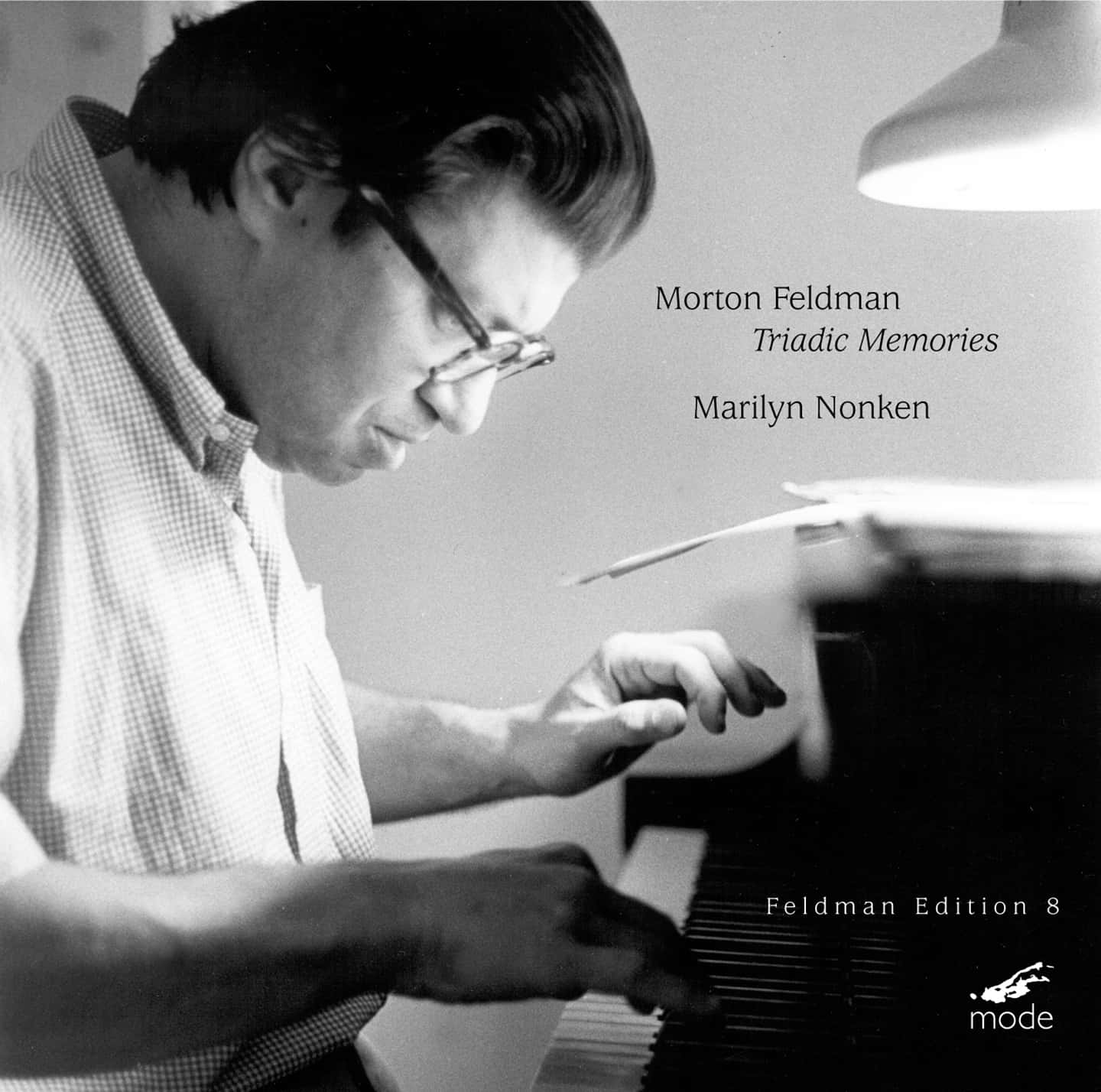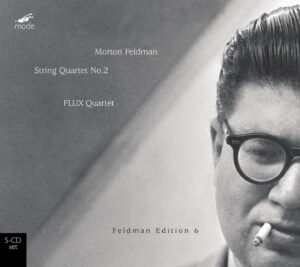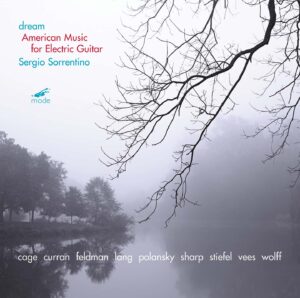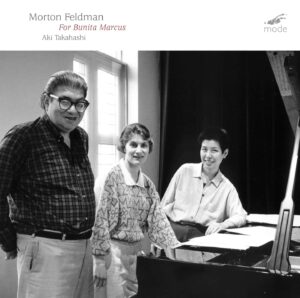Feldman Edition 7-Triadic Memories - CD
Includes program notes. Streaming audio. Title from image of compact disc cover on Web page (viewed Nov. 21, 2008) Marilyn Nonken, piano. Recorded at the Foellinger Great Hall, Krannert Center for the Performing Arts, University of Illinois, Urbana-Champaign, May 29, 2003. Also available as compact disc; previously issued as Mode Records mode 136.
Triadic Memories (1981) (93:48 total)
Marilyn Nonken, piano
1. Page 1, System 1, Measure 1 (5:00)
2. Page 5, System 2, Measure 1 (9:56)
3. Page 13, System 1, Measure 4 (20:37)
4. Page 19, System 4, Measure 1 (11:15)
5. Page 25, System 1, Measure 3 (8:46)
6. Page 30, System 4, Measure 1 (5:25)
7. Page 34, System 3, Measure 4 (4:09)
8. Page 38, System 4, Measure 3 (16:57)
9. Page 44, System 1, Measure 1 (11:41)
The place Triadic Memories takes us is full of illusions, not only of function and direction but also of timelessness and stasis.
- This 94-minute, single movement work for solo piano is available in two formats: as a specially priced 2-CD set ($19.99) and complete and uninterrupted on one single audio-only DVD ($19.99)
- The DVD is presented in uncompressed, high-resolution 96khz/24-bit stereo, playable on any DVD player.
- Both the CD and DVD versions have numerous arbitrary track markers to ease navigation through this continuous, one-movement piece.
- Recorded from the pianist’s perspective, it gives the listener the unique opportunity to hear all of the small nuances and overtones which can be lost in the concert hall.
- There is no indication of tempo. For this recording, Ms. Nonken chose a steady eighth-note pulse throughout that approximates the heart rate at rest. Unfolding in time at this rate, the work’s geography – its rapturous peaks and long, low valleys – is brought into relief.
- Of Ms. Nonken’s October 2003 performance of Triadic Memories, John Rockwell wrote in The New York Times: ” Ms. Nonken played it with a relaxed, almost rubber-wristed calm, caressing the keys without losing rhythmic definition. A lovely performance of a lovely piece”.
- Bonus only on the DVD: A video interview of Marilyn Nonken speaking about Triadic Memories
- This DVD is playable on ALL DVD players.
Reviews
Morton Feldman
Marilyn Nonken plays Triadic Memories
Mode 136
Strangely wonderful sounds to take them by surprise
The world has a misguided notion that Christmas presents ought to be safe choices, nothing that will rock anybody’s boat or evict them from their comfort zone. Why is that? Chances are, people aren’t going to love or even like their gifts no matter how safe they are. The nature of a gift implies the unexpected, the unneeded, and something the recipient may not know about. Why not make it strange and wonderful?
Consider the following:
Strauss: Daphne. (Decca, two discs.)
Leonard Bernstein: The Concert Collection. (Kultur, nine DVDs.)
Rameau: Les Indes Galantes. Paris Opera. (Opus Arte, two DVDs.)
Handel’s Messiah.(Koch Lorber DVD.)
Handel’s Messiah. Concentus Musicus Wien, Nikolaus Harnoncourt conducting. (Deutsche Harmonia Mundi, two CDs.)
Amadeus Quartet: The Cologne Years. (Andante, two CDs.) T
Magnus Lindberg: Clarinet Concerto, Gran Duo and Chorale. Karl Kriikku, clarinet. Finnish Radio Symphony Orchestra, Sakari Oramo. (Ondine, CD.)Puccini: Madama Butterfly. Netherlands Opera, Edo de Waart conducting. (Opus Arte, two DVDs.)
Offenbach: The Grand Duchess of Gérolstein. Les Musiciens du Louvre, Marc Minkowski conducting. (Virgin, two CDs.)
Beethoven; Piano Sonatas 16-26. Kun-Woo Paik, piano. (Decca, three CDs.)
Victoria: Requiem 1605. The Sixteen, Harry Christophers conducting. (Coro, CD.)
Morton Feldman: Triadic Memories. Marilyn Nonken, piano. (Mode, two CDs.)
Even if you’re not up for discerning the grand construction in Feldman’s meditative, pared-down music, its medicinal value is so strong that, while I was recovering from surgery, it worked as well as Motrin – or the Mozart piano concertos I have used after a wisdom-teeth extraction. Think of what Feldman could do for hangovers.
— David Patrick Stearns, Inquirer Music Critic
Philadelphia Inquirer, December 18, 2005
Morton Feldman
Marilyn Nonken plays Triadic Memories
Mode 136
‘Ms. Nonken is a Steinway artist’, the sleeve notes rather sternly trumpet, but rarely has the sound of a piano been so appropriate for the music of Morton Feldman. Triadic Memories (1981) has had mixed fortunes on CD. Roger woodward’s performance on Etcetera is nothing short of historic: John Tilbury’s Londonhall version is expertly played but ruined by a third-rate piano, leaving Louis Goldstein’s recent recording on Offseason Productions as the only serious contender. Goldstein’s crystal-clear textures and daringly slow tempo search for extremes, and his is a true hardcore Feldman experience. Nonken defines more of a middle-ground. Her rhythms are still deliberate and she uses plenty of space, but she aims for a seamless path. Feldman aficionados will perhaps instinctively gravitate towards Goldstein, but Nonken’s Triadic Memories could make the piece more open to the uninitiated.
The rationale behind Triadic Memories – as its typically direct title suggests – is the use of directional harmony stripped of its usual context and purpose. ‘There is a suggestion that what we hear is functional and directional,’ Feldman wrote, ‘but we soon realise that this is an illusion; a bit like walking through the streets of Berlin – where all the buildings look alike, even if they’re not.’ The inspiration Feldman took from the Abstract Expressionist canvases of Philip Guston and Mark Rothko is perhaps even more pertinent to Triadic Memories than elsewhere in his output. His material might feel pared back, but he transforms it into vast overarching spans, locking his minimal material and grandstanding structures into taut dialectical tension. Likewise, Rothko’s canvases create the illusion of a single block of colour hanging in space, when in reality all the edges are blurred and the distinction between background and foreground is intriguingly indistinct. Triadic Memories is an exercise in rapid overlapping of material verses sudden stasis: between clear bell-like tones and long decays, and of a curious inner-logic that works its magic while remaining tantalisingly out of reach. The clarity of Nonken’s textures and her ease of movement through the labyrinthine structure has much to recommend it. The recorded sound is quite outstanding too, and the disc is also available on a DVD including Nonken’s 20-minute discussion of the piece.
—Philip Clark
Morton Feldman
Marilyn Nonken plays Triadic Memories
Mode 136
Don’t Touch that Dial
You old codgers my age will remember that on Morton Feldman’s vinyl recordings from the ’70s, there was often a warning on the back cover: “Play at a low volume level.” The music was supposed to be soft, but it seemed a disservice to record it at a low level – might as well get the best signal-to-noise ratio possible and leave the composer’s intended dynamics to the mercy of the consumer and his volume knob. Well, pianist Marilyn Nonken gave me her new Mode recording of Feldman’s Triadic Memories, and told me that it had been recorded very close-miked on a magnificent piano so that you could hear every nuance of what went on around the piano strings, and therefore I needed to play it at a quiet level. I chuckled at the memory, and then, sure enough, on the back of the program booklet is a warning in big letters: “play softly”.
Well, she’s right. The sound on this disc is so superbly present that if you leave your stereo at a normal level, you get the bizarre effect of a piano being softly played and outrageously amplified. You have to turn it down, and even so, every detail is just as close as if you were leaning over the soundboard while she plays. Nonken’s performance is equally detailed. There’s such a temptation with Triadic Memories – Feldman’s greatest piano piece, and thus one of the great piano works of the 20th century, 80 to 90 minutes long and now available on at least seven different recordings – there’s such a temptation to smooth out the prickly rhythms, and let the music float and turn ambient. Nonken resists. Her rhythms twist and turn with Feldman’s peculiar notation, and her tone color, though soft, is melodically urgent, not self-effacing. It’s a dynamite performance captured on a spectacularly pristine recording.
— Kyle Gann, www.artsjournal.com, Wednesday, June 22, 2005
posted by kgann @ 11:23 am
Morton Feldman
FELDMAN Triadic Memories (Feldman Edition 8)
Marilyn Nonken
Contemporary classical
Mode 136

Some modernist composers such as Stockhausen want to embrace everything in their music. Others work by exclusion, ruthlessly paring their music down until only the essential core remains. The American composer Morton Feldman, who died in 1987 aged 61, was perhaps the most ruthless of all these great renouncers. He didn’t want lyricism or complication or any of the storm and stress and conflict that go with “expression”. What he wanted was to “tint the air ” with gentle sounds, revealed in slowly changing patterns.
The pattern that launches this piece is a particularly fascinating one: we hear two repeating figures, one high, one low, which gradually move together and then cross to opposite ends of the piano. And so it goes on for 93 minutes, in a state of suspended animation that will entrance some listeners and infuriate many others. Any pianist wanting to play Feldman needs the most exquisite touch, and also great stamina, and Marilyn Nonken clearly has both in abundance.
— Ivan Hewett, The London Times, August 14, 2004
Morton Feldman
FELDMAN Triadic Memories (Feldman Edition 8)
Marilyn Nonken (pn)
Mode 136
[93.48] 2 CD or 1 DVD
‘Triadic Memories’ (1981) has enjoyed a relatively long recording history on compact disc and in contrast to last year’s Late Works with Clarinet (Mode 119), Mode’s new Feldman disc has a host of other recordings to contend with. Indeed, the chances are that subscribers to Why Patterns already own at least one recording of this seminal piano work, which makes it somewhat pertinent to ask if owning yet another is absolutely necessary. To cut to the quick, however, this is the finest Feldman release I’ve heard so far this year. I was able to compare the recording (in both formats) with interpretations by John Tilbury (Londonhall), Roger Woodward (Etcetera) and Louis Goldstein (Offseason Productions), and frankly only the Goldstein offers serious competition. Subscribers will be familiar with the extravagances of the Woodward, and the deficiencies of Tilbury’s piano have never appeared more pronounced than when compared to Marilyn Nonken’s interpretation. As she makes clear in her linear notes, attention was paid to both the choice of instrument and the recording venue, and the decision to opt for a Hamburg Steinway at the Krannert Center, University of Illinois was certainly an excellent one. The instrument’s tone is satisfyingly rich and importantly for the piece the naturalness of the decay is astonishingly beautiful.
Indeed, clumsy as the word is, ‘naturalness’ is perhaps a pertinent adjective to describe this recording. Being a work without a marked tempo, interpretations of ‘Triadic Memories’ vary greatly in length. They range from about seventy minutes to around one hundred and ten. For her part, Nonken’s decision to opt for a regular eighth-note pulse that ‘approximates the heart-rate at rest’ gives this ‘Triadic Memories’ a satisfyingly anthropomorphic texture that not only feels right but also helps heighten the listener’s awareness of the piece’s rhythmic complexity. It is certainly a clever way to support the tactile immediacy of the sound whilst orientating the thoughtful listener towards that old Abstract Expressionist chestnut of the relation between abstraction and physicality. Admittedly, I can imagine that experienced listener’s may find it a little too comfortable, lacking something of the edge that Louis Goldstein manages to draw from the piece for example, but it simply depends on how you like your Feldman. Given that the piece’s great beauty resides with the clustering and overlapping of its decaying notes, however, Nonken’s interpretation particularly recommends itself to those searching for their first ‘Triadic Memories’ (or even their first experience of Feldman for that matter). Very simply, I think it easier to hear and experience this essential aspect of Feldman on this recording than on any other recording of the solo piano music I’ve yet heard and if you are looking to introduce a friend or family-member to Feldman then this disc should be a serious contender.
Like the Flux Quartet’s recording of ‘String Quartet II’ on Mode 112, Mode 136 is available in two formats: a 2 CD edition and a single DVD. Both index the work into nine sections with the CD edition opting to have a short second disc rather than breaking the work evenly. The DVD includes a twenty-minute discussion of the piece by the performer and although managing to be interesting and informative without becoming overtly technical, this worthwhile extra does suffer from a somewhat hyperactive camera and an absence of German or French subtitles. Nevertheless, I hope Mode continue to expand in this area. (I’m sure that I’m not the only one who would welcome the chance to hear Aki Takahashi discuss ‘For Bunita Marcus’ on the forthcoming Feldman Edition 10, although I fear the piece’s length will see Mode opt for a CD only release). Similarly, and as we’ve come to expect from the label, both formats sound fantastic. The DVD has the slight edge in terms of definition: never have I heard the softness of Feldman’s attack sounding so crisp and clean, and adding this to the fact that the DVD offers a chance to hear the ninety-minute performance uninterrupted, it is certainly the one to go for if you have the audio equipment to support the format.
— Alan Nicholson, Why Patterns website, 1st August 2004




